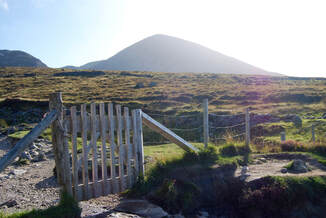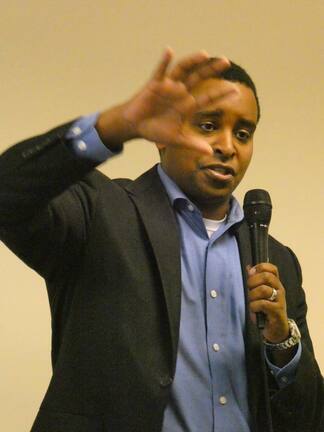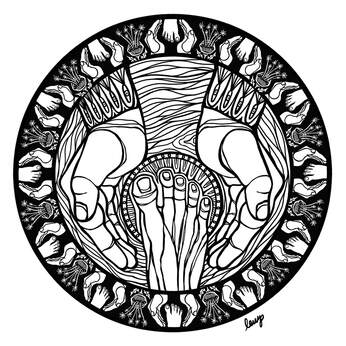 By Albrecht Dürer - Unknown source, Public Domain, https://commons.wikimedia.org/w/index.php?curid=5158869 By Albrecht Dürer - Unknown source, Public Domain, https://commons.wikimedia.org/w/index.php?curid=5158869 by the Rev. Dr. Mark Lee Over these last two weeks, I’ve read many people say that this current situation is “apocalyptic.” This is one of those theological terms that has captured the popular imagination. I think people are right to use it, though not in quite the way they think. Usually something is referred to as apocalyptic when there is extraordinary disaster or catastrophe. The first definition offered on Google is, “1. the complete final destruction of the world, as described in the biblical book of Revelation and 2. an event involving destruction or damage on an awesome or catastrophic scale." The older name for the last book of the Bible we usually call the Book of Revelation is “The Apocalypse.” Images of pestilence, ecological catastrophe, drought, earthquakes, floods, loosed demons, war in heaven and on earth, and finally, the complete end of the present age and the world it inhabits fill much of the book. For the apostle John who saw these visions, and for the community to whom he was writing, this was not an exercise in disaster porn. It wasn’t even the schadenfreude of seeing their oppressors judged and destroyed by God. Cinematic horror films terribly miss the point. It was a deep encouragement that despite their persecution unto martyrdom, God has not forgotten them, remembers their suffering and faithfulness, and will rescue and reward them in the End. That is the point of the book of Revelation; that is what is being revealed in this book. Which is the core meaning of “apocalyptic”: revealing, unveiling, showing forth, exposing the reality of things. In the vision John saw, God lifted the veil off the everyday news of the tribulations his community was enduring and showed them the deep truth of God’s work in the universe on their behalf. It is this meaning that is more helpful as we consider our own situation to be “apocalyptic.” What has this virus revealed? What has been exposed? Some may be things we already knew, but stand in sharper view, others may be things that have been hidden but are now clear. So we now see that our country’s medical system has enormous gaps in its organization, financing, and delivery. We see people’s resistance to change until a situation affects them directly. We see that focusing solely on profit to the exclusion of other stakeholders warps the actions of corporations. This crisis lays bare longstanding fissures of race and class we usually prefer to ignore but now cannot. We see the bankruptcy of ideologies that divide us from the rest of the world and from one another. We see how government can mobilize vast resources which no individual church, community or company can mobilize alone. We see the practical results of wise management versus corrupt management of those resources, seeing which lives are valued and which are lost. This apocalypse reveals things about our society we must deal with. You cannot unsee these things. This also reveals things at a more personal level. Being yanked out of my normal routines and connections, I have had to face my own fears. Every scratchy throat or cough, and I wonder, “Is this IT?” Will the economy collapse so severely and for so long that my paycheck and my husband’s pension dry up? What about my 87-year-old father, what if he gets it and I can’t help? What if this lasts so long that we really, truly, completely run out of … toilet paper!? Will I have to install one of those nifty hand spray bidets that were everywhere in the Middle East? And learn to use it without spraying it all over everything in every direction? What if I get sick when the hospital is overwhelmed, and because of my age and medical history don’t make the triage cut? And what about…. I’ve been having weirder dreams than usual, and even some nightmares, subconscious alarm bells sounding. I remind myself that we have not landed in a “Mad Max” movie. And then there is the anger. I don’t do anger well, so like to keep it well quashed (which my therapist keeps saying isn’t the right approach). I watch the news and see certain politician’s policies, and my blood boils. Yelling at the TV is only so satisfying. So I get snarky with my husband and grouchy with the animals. Or I go on Facebook, and see the same stories magnified time upon time. In a fit of pique, I write a massive screed, to REALLY tell off the Stupid Person who reposted the Dumb Thing. My anger combines with others who also have time hanging heavy on their hands, and normally placid chat rooms and email lists become hotbeds of misunderstanding, intrigue and drama. Better to channel my anger at this whole situation into constructive work, efforts that are pro-active instead of reactive, telling the world what I do believe rather than why someone else is wrong. Because the anger unmanaged makes my obviously correct and righteous views toxic to me -- and doesn’t convince whoever I’m writing at anyway. I would do far better to close the laptop and go work in the garden. Or cook. Or read a book. Or play with the dog. Or nap. Or what about praying! Thank God that fear and anger are not all that is being revealed. I see creativity, care and compassion as well. Our situation has revealed an amazing outpouring of creativity. I’ve seen colleagues who never imagined live-streaming church come up with a huge variety of ways to keep people connected with God and one another. Some, like Plymouth, livestream their services, with either a skeleton crew at the building or with different people contributing parts of the service from their homes. Some have assembled prepared clips of musicians, preachers, readings and edit them together. I’ve seen an explosion of online devotionals, musical offerings, children’s stories, and even fellowship time. I’ve seen poems online from people I had no idea wrote poetry, and strings of uncaptioned beautiful landscape photos “so we can still travel in our hearts.” The best thing I’ve seen? A hilarious “blooper reel” of worship outtakes by some clergy friends, which let me know that their polished presentation (of which I was vaguely jealous) was definitely not the first cut! This virus has revealed deep wells of caring and sharing. I’ve had friends who I’ve not seen in many years set up online Virtual Coffee with me. Nearly every phone call, email or text includes people asking, “Do you need anything? I can shop for you, since you can’t go out.” People have contacted the church with the same offer, to be “Gofers” for those who are isolated. Others have offered funds to cover for those in a bind. Medical masks have been pulled from back cupboards and donated to hospitals. Folk let others into the checkout line ahead of them, smile at the clerks, and give them compliments for holding up amid the rush of extra work. Owners of small businesses are finding ways to keep employees on their health insurance even while furloughed. Many 12-Step groups are connecting online, providing live-saving support for people who might otherwise relapse – and helping those who do relapse to start living One Day At A Time once again. The stories of care are unlimited. Look for them. This is an apocalypse worth paying attention to. Where it reveals things in society or our own psyche that need healing and change, we have Sabbath time and space to do so. Where it unveils the wells of love and compassion that already there, we can nurture those virtues. John’s Apocalypse does not end with fire and brimstone, but with the ever-loving presence of God: And I heard a loud voice from the throne saying, “See, the home of God is among mortals. He will dwell with them; they will be his peoples, and God himself will be with them; he will wipe every tear from their eyes. Death will be no more; mourning and crying and pain will be no more, for the first things have passed away.” And the one who was seated on the throne said, “See, I am making all things new.” …Then he said to me, “It is done! I am the Alpha and the Omega, the beginning and the end. To the thirsty I will give water as a gift from the spring of the water of life. Those who conquer will inherit these things, and I will be their God and they will be my children.” (Revelation 21:3-7) I pray that promise is among the things this apocalypse is revealing to you. Or as a beloved mentor would tell me, “Fear not! This too shall pass.” Peace, Mark PS: If you, like me, have a compromised immune system, or the calendar says you are “older” despite what you tell yourself, we have volunteers who are willing to do shopping or other simple errands for you. Also, if you need financial help, we have members who are willing to help out by donating through our church assistance funds. Contact one of the ministers (Hal, Carla, Jane Anne) and they will work to connect you. AuthorMark recently celebrated his tenth anniversary as Plymouth’s Director of Christian Formation for Adults. He also serves as chair of the Platte Valley Association's Committee on Ministry.  By Own work by Ecw.technoid.dweeb - I (Ecw.Technoid.Dweeb | contributions | talk | ☮✌☮) created this work entirely by myself., Public Domain, https://commons.wikimedia.org/w/index.php?curid=12477587 By Own work by Ecw.technoid.dweeb - I (Ecw.Technoid.Dweeb | contributions | talk | ☮✌☮) created this work entirely by myself., Public Domain, https://commons.wikimedia.org/w/index.php?curid=12477587 by Mark Heiskanen Director of Music Those who I have worked with in rehearsal will have heard me speak to the virtues of silence. In a musical score, these easily dismissed moments are notated as rests. There are many kinds of rests expressing varied durations, literal or approximate. Sometimes, the only indication of a rest from a choral composer is a breath mark. So, how long is that breath? This decision by a performer or conductor is crucial to the phrasing and musical satisfaction of the work for music maker and listener alike. What one is basically determining is the value and quality of the silence. Another way silence is expressed in musical terms is through articulation and agogic accents. As an organist, these tools are essential for an instrument that does not offer much in the way of touch sensitivity. One solution is to impose a variation of touch. In Baroque music, the standard approach is through the concept of Ordinary Touch. An articulated legato technique named by Baroque writers, the performer leaves a slight space between each note while retaining the forward momentum of a phrase. These tiny spaces offer rhythmic clarity and definition to each note played. This is a helpful approach for a musical style that often embodies a dance-like character. The agogic accent is a manipulation of the timing between two musical moments. For example, by delaying the onset of a chord following a rest by just a microsecond, a sense of anticipation and drama can be achieved. The maligned pregnant pause can be repurposed for sound artistic ends. Thirty years ago, the band Depeche Mode released a video for a fantastic tune of theirs called "Enjoy the Silence." In the video, singer Dave Gahan, attired in the garb of a wandering king, travels through a scenic landscape carrying a cheap fold up chair. Occasionally, he is inspired by the view to set it up, have a seat, and take in the wondrous panorama of mountains and forests. After this brief interlude, he folds up the chair and continues his journey seeking out another scenic vantage point to enjoy. His lonely journey through the wilderness is only a metaphoric representation of the song's lyrics. But I have found this song title freely entering my mind these days. When depicting the value of the musical rest in rehearsals, I have often offered the directive, "enjoy the silence!" It has value. And not just one beat, or two, or three...the value is in the quality of silence. The silence affects our perception of a musical phrase. The quality of the release of one note prepares for the onset of the next. We can perceive these subtleties of space whether consciously or not. Here's to hoping we can all, in this time, appreciate the space in between. Enjoy. AuthorMark Heiskanen has been Plymouth's Director of Music since September 2017. Originally from Northeast Ohio, Mark has experience and great interest in a diverse range of musical styles including jazz, rock, musical theatre, and gospel. He is thrilled to serve a congregation and staff that values diversity and inclusion in all facets of life. Read his mostly-weekly Music Minute here.  Photo: J.A. Ferguson Photo: J.A. Ferguson Christ with me, Christ before me, Christ behind me, Christ within me, Christ beneath me, Christ above me, Christ at my right, Christ at my left, Christ in the heart of everyone who thinks of me, Christ in the mouth of everyone who speaks to me, Christ in every eye that sees me, Christ in every ear that hears me. From St. Patrick’s Breastplate I write to you today sitting at my kitchen island as we all hunker down further into this time of self-isolation and quarantine. I just heard that my gym was closed for 30 days and my acupuncturist for 1-2 weeks. We will hold staff meeting today by Zoom conference calling. It seems there is another confirmed case of Covid-19 in Loveland. (Please pray for those involved! You can read about it here at the Larimer County website.) These are different, interesting, anxiety-producing times. Yet life goes on...And good things happen! Today we will celebrate Christopher Chorpenning’s 19th birthday with pizza and Guinness and Torte della Nona, our favorite Italian dessert! (Hal is making it as I write....wish I could insert the wonderful smells of custard and toasted pine nuts into this reflection!) Yesterday I walked in the sunshine and took pizza to a friend who had just moved and broken her hand in the process. Today we are receiving moisture that we always need in Colorado. What are you celebrating today? The quotation above from St. Patrick’s Breastplate, an ancient Irish loricaor hymn, reminds me that God in Christ is always with us, protecting, accompanying, healing. I have prayed with it often. The Breastplate is a very long 5th century hymn in the style of Druidic poetry that is attributed to St. Patrick. Each verse begins with the phrase, “I arise today” or “I bind to myself today” and calls for the divine protection of God in the Trinity, God as Creator, God as Christ, God as Spirit. (You can read the whole of it at this link.) Legend has it that St. Patrick sang this when an ambush was laid against him and his followers by the High King Learyto prevent him from going Tara to share the faith at the High King’s seat of power. A miracle happened and it appeared to those lying in ambush that St. Patrick and his monks were wild deer with a fawn following them. (Thus, the hymn is also called, The Deer’s Cry.) They were protected because know that Patrick and his followers shared the faith all across Ireland. I invite you today to and in the coming days to use the portion of St. Patrick’s hymn quoted above as a prayer of protection when you are anxious You can also sing it! Below are words from a hymn in our hymnal that uses another portion of the Breastplate. And there is a link in the first line to an American choir singing the same tune in our hymnal. I sing as I arise today! I call on my Creator’s might: The will of God to be my guide, The eye of God to be my sight, The word of God to be my speech, The hand of God to be my stay, The shield of God to be my strength, The path of God to be my way. Alleluia, alleluia, Alleluia, alleluia, Alleluia, alleluia, Alleluia, alleluia. I leave you with a final link on the very Irish morning here in Colorado...our weather fits what they call “a soft day” in Ireland....I arise today. This is a beautiful contemplative rendition of St. Patrick’s hymn with prayerful pictures of Ireland and people celebrating the joy of God’s love. Beannacht! Blessings in Gaelic! With you on this wilderness journey, PS....Don’t forget our livestreaming worship coming to you Sundays at 11 am on our Facebook page! AuthorThe Rev. Jane Anne Ferguson, Associate Minister, is a writer, storyteller, and contributor to Feasting on the Word, a popular biblical commentary. She is also the writer of sermon-stories.com, a lectionary-based story-commentary series. Read more  It is great to have your Congressman visit your church, and it is even better when he comments, “You are the most active church in the area, if not in the state of Colorado.” That is what Rep. Joe Neguse told an overflow crowd in Plymouth’s Forum Room last Sunday morning. Neguse was with us as part of the Adult Ed. Forum series on Ending Gun Violence, and he is sponsoring several bills in the House of Representatives aimed as sensible gun legislation, including national background checks. (Special thanks to Anne Thompson and Mark Lee for arranging this extraordinary visit!) Carla's sermon on putting John 3.16 into context was a winner, and the choir’s a cappella rendition of Ola Gjeilo’s setting of “Ubi Caritas” was deeply moving. And then a crowd of Plymouth folks gathered along Prospect Road to show signs of support for the full inclusion of LGBTQ+ people in every aspect of the life of the church and society. Again, kudos to Mark Lee for helping organize the event across several congregations…I designed the signs. : ) The event was planned by a group of progressive clergy in Fort Collins as a positive response to several local evangelical congregations that sponsored workshops on what to me seems like a “kinder, gentler” form of homophobia. Rather than dwell of condemning others or arguing with them, we chose the path of trying to present a response that affirms who we are as Christians and sends a message of inclusion and welcome to all LGBTQ+ folks. I was heartened to see so many of you literally out in front! We had members in their teens through their 80s waving colorful placards and rainbow flags I counted three flag variations!) to passing motorists, many of whom honked or waved in support. (We know what Plymouth stands for — the same thing Jesus stood for — love.) It was a beautiful and affirming time for Plymouth last Sunday! I also want to acknowledge that for many of us news about the coronavirus is getting overwhelming and maybe even scary. Please be assured that we are keeping abreast of the news and CDC recommendations and will do everything we can to keep you safe while you’re at Plymouth. (And we are working on a live stream of one of our services, which is likely to come out via Facebook, so if you haven’t “liked” Plymouth's Facebook Page, it’s a good time to do so!) I’ve just heard that we have the first coronavirus diagnosis in Larimer County, so stay tuned for further information about how we will continue to respond. In the meantime, here is a prayer: God of all things, we ask for your presence with all those affected by the corona virus. We ask for your strength to be with all those who are working for treatment and prevention. As we continue our pilgrimage this Lent, help us to trust in you and your desire for our wholeness. Grant us wisdom, grant us courage. Amen. AuthorThe Rev. Hal Chorpenning has been Plymouth's senior minister since 2002. Before that, he was associate conference minister with the Connecticut Conference of the UCC. A grant from the Lilly Endowment enabled him to study Celtic Christianity in the UK and Ireland. Prior to ordained ministry, Hal had a business in corporate communications. Read more about Hal.  We asked you to go to the Wilderness for Lent, and I wonder how it is going for each of you. I wonder because this is a time of deep spiritual questioning. The wilderness is a metaphor that encourages us to let go of what our expectations of those things that prevent us from fully experiencing God. What are those questions you are wrestling with? Questions rarely come with an easy answer, which is why letting go of what keeps us separate from God and living into our fullest self is a faith journey. Faith can live in the darkness of the wilderness and it can also bring into light the unknown of what we are searching for. To wonder in the wilderness and to wander with our faith, we may struggle to trust God enough to live without absolute certainty about who God is. This is how we slowly begin to understand the nature of God in our lives. I pray that in your wondering, answers to your deepest questions are providing a sense of surprise and awe. Blessings, Carla AuthorIn December, Carla started her two-year designated term pastorate at Plymouth. She spent the last 5 years consulting with churches on strategic planning, conflict transformation and visioning. Before going to seminary she volunteered at her church through Stephen Ministry, visiting ministries and leading worship services at a memory care unit and a healthcare facility. She served on the Board of Directors for the Iowa conference of the United Church of Christ. |
Details
|


 RSS Feed
RSS Feed